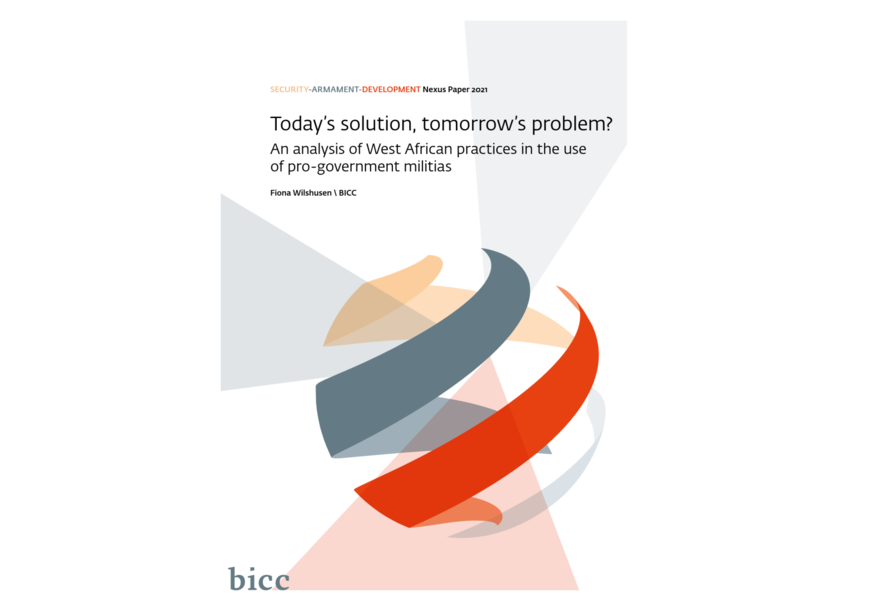Press releases
New publication \ Pro-government armed militias in the Sahel: ”Conflict solvers” or “spoilers of peace”?
International military interventions in the Sahel have so far failed to help improve the conflict situation in the region. At the same time, militias supported by the regional governments are actively involved in the fight against Islamist movements. The Paper "Today’s solution, tomorrow’s problem? An analysis of West African practices in the use of pro-government militias" examines how the operation of these groups affects violence against civilians. This is the first of a row of SAD-Nexus Papers (Security–Armament–Development) that BICC publishes annually with funding from the German Federal Ministry for Economic Cooperation and Development (BMZ).

Fiona Wilshusen, the author of SAD-Nexus Paper (Security–Armament–Development) 1\2021, points to a dangerous dilemma created by pro-government militias (PGM): “In the short term, pro-government militias can help ensure local security under certain circumstances. However, if they develop their own agenda, as in Mali, which jeopardises human rights, security and development, they can turn into spoilers of peace in the long term.” The illegal transfer of weapons and equipment in particular fuels violence in the region.
Exceptions, on the other hand, are pro-government militias that—as in Cameroon, for example—are defensive in nature and predominantly unarmed. “If these groups are socially embedded in the communities they are supposed to protect and are controlled by local authorities, they contribute to a decrease in violence against civilians”, explains researcher Fiona Wilshusen.
The author also highlights the challenges for German development policy posed by the emergence of pro-government, armed militias, particularly in (post-)conflict situations: “Since many of these groups persist beyond the end of an armed conflict, they also need to be taken into account in reconstruction processes—in particular in demobilisation, disarmament and reintegration programmes and security sector reforms—to enable sustainable peace and development”.
German and European arms exports policies should also consider the actions of pro-government, armed militias. Burkina Faso, Mali and Nigeria not only cooperate with these groups but have also (most likely) supplied them with weapons. These countries, like Niger, are important partners of the German Enable and Enhance Initiative (Ertüchtigungsinitiative) and are also eligible to receive military weapons and equipment through the European Peace Facility (EPF). “This underscores the need for strict arms exports restrictions or later post-shipment controls at the European level”, the author concludes.
***
In the framework of the project “Security, armament and development in recipient countries of German arms exports (Country Reports and the Global Militarisation Index (GMI). They are published annually and are predominantly based on field research.
Press release "Neue Publikation \ Regierungsnahe bewaffnete Milizen in der Sahel-Region – Konfliktlöser oder Friedensverhinderer?" (pdf, in German)
Exceptions, on the other hand, are pro-government militias that—as in Cameroon, for example—are defensive in nature and predominantly unarmed. “If these groups are socially embedded in the communities they are supposed to protect and are controlled by local authorities, they contribute to a decrease in violence against civilians”, explains researcher Fiona Wilshusen.
The author also highlights the challenges for German development policy posed by the emergence of pro-government, armed militias, particularly in (post-)conflict situations: “Since many of these groups persist beyond the end of an armed conflict, they also need to be taken into account in reconstruction processes—in particular in demobilisation, disarmament and reintegration programmes and security sector reforms—to enable sustainable peace and development”.
German and European arms exports policies should also consider the actions of pro-government, armed militias. Burkina Faso, Mali and Nigeria not only cooperate with these groups but have also (most likely) supplied them with weapons. These countries, like Niger, are important partners of the German Enable and Enhance Initiative (Ertüchtigungsinitiative) and are also eligible to receive military weapons and equipment through the European Peace Facility (EPF). “This underscores the need for strict arms exports restrictions or later post-shipment controls at the European level”, the author concludes.
***
In the framework of the project “Security, armament and development in recipient countries of German arms exports (Country Reports and the Global Militarisation Index (GMI). They are published annually and are predominantly based on field research.
Press release "Neue Publikation \ Regierungsnahe bewaffnete Milizen in der Sahel-Region – Konfliktlöser oder Friedensverhinderer?" (pdf, in German)


